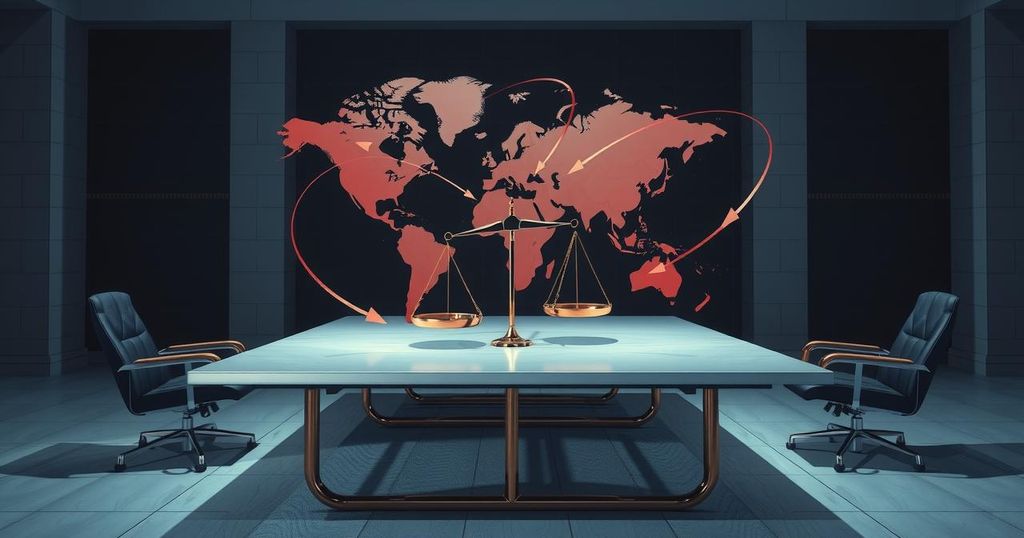On February 1, President Trump announced a 25% tariff on goods imported from Mexico and Canada, marking a change in North American trade policy that could raise consumer prices. The administration is debating the broader implications of this move, including potential tariffs on additional countries, creating uncertainty regarding the impact on the economy and international relations.
On February 1, President Donald Trump announced a significant shift in North American trade policy by imposing a 25% tariff on goods from Mexico and Canada. This decision could consequently increase prices for American consumers. He is anticipated to unveil his broader trade policy in an executive action, which is currently seen as a temporary measure rather than a definitive introduction of global tariffs.
In discussions surrounding tariffs on China, Trump highlighted that the extensive tariffs initiated during his first term remain in place under President Joe Biden’s administration. Trump has previously advocated for across-the-board tariffs, proposing a 20% tax on imports from all countries, a 25% tax on goods from Mexico and Canada, and a 60% levy on Chinese imports. Additionally, he has suggested using tariffs as leverage in negotiations with various nations.
The proposed executive action comes as Trump’s economic team collaborates to strategize the implementation of these tariffs. Although administration officials are still debating the specifics, Trump expressed his intent to overhaul trade policies in his inaugural address. He emphasized protection of American workers and families, advocating for tariffs on foreign countries as a way to enhance wealth for American citizens.
During his address, Trump also proposed the creation of a new government office, dubbed the “External Revenue Service,” tasked with collecting tariff revenue. He asserted that this initiative would significantly increase funds flowing into the U.S. Treasury. However, the precise execution of this plan remains uncertain and has prompted discussions among his economic advisors.
Variations in strategy include considering smaller initial tariffs that could increase over time or implementing delays before the tariffs go into effect, providing room for negotiations. There is also focus on identifying a legal framework to uphold the tariffs, which may be backed by emergency powers, affording the president the authority to regulate imports.
The debate among Trump’s economic advisors recalls past discussions during his first term, where differing views on tariff implementation were common. Market-sensitive officials advocate for a more measured approach, while proponents of robust tariffs underscore the necessity for a strong message. The ongoing negotiations in Congress may influence the final direction of these tariff policies.
While the tariffs may amplify costs for U.S. consumers, who are already facing inflation, the administration continues to assert that foreign entities will bear the burden of these taxes. However, research has indicated that American consumers may ultimately face increased prices. The proposed tariffs are particularly likely to escalate costs on a range of imported goods, including electronics and toys.
The potential implementation of Trump’s tariffs could exacerbate inflation, disrupt the stock market, and lead to a trade war due to retaliatory actions from affected countries, reminiscent of challenges faced during previous tariffs on U.S. products. As Trump remains committed to fulfilling his campaign promises, the specifics of the tariff policy and its repercussions will need to be addressed carefully.
The article discusses President Donald Trump’s decision to impose a 25% tariff on goods from Mexico and Canada, which marks a noteworthy shift in trade policy. It highlights Trump’s commitment to tariffs as a negotiating tool during his prior administration and outlines the continued debates within his economic team regarding tariff implementation. The potential impact of these tariffs on American consumers and the economy at large is also examined.
President Trump’s announcement of significant tariffs on Mexico and Canada indicates a strategic shift in U.S. trade policy, with expectations of higher consumer prices and potential inflationary pressure. The administration is still deliberating on specifics, including legal justifications for the tariffs and alternative strategies. While Trump aims to bolster American interests, the implications of renewed tariffs could lead to economic challenges, including possible retaliatory trade actions and increased costs for consumers.
Original Source: www.cnn.com






